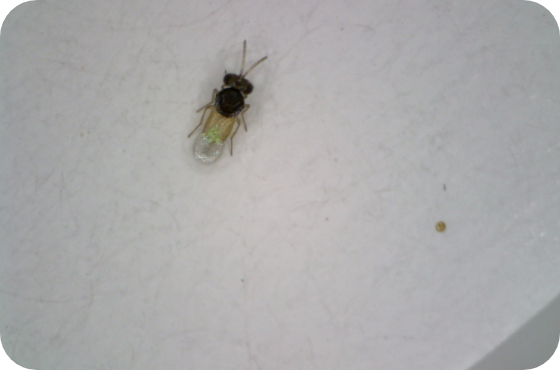Quality Products
Fast Delivery
Premium Service
Written by Kevin van Kester | Last update: 23. December 2020
Encarsia Formosa, commonly referred to as the parasitic wasp Encarsia, serves as an effective organic whitefly control solution. This beneficial insect is suitable for use in both vegetable and ornamental cultivation.

Encarsia formosa is a tiny parasitic wasp measuring about half a millimetre with a brown head and yellow abdomen. This wasp is highly effective in controlling whitefly populations, as Encarsia relies on whiteflies for reproduction, demonstrating keen predatory behaviour.
The female wasps are particularly efficient, each parasitizing between 250 and 450 whitefly larvae. They employ two main strategies:
Encarsia’s targeted approach makes it a valuable tool in greenhouse whitefly control.
Encarsia formosa targets the greenhouse whitefly (Trialeurodes vaporariorum) and the cabbage whitefly (Aleyrodes proletella).
One of the key benefits of using Encarsia is its rapid development compared to that of the whitefly, which helps to quickly reduce whitefly populations. Additionally, monitoring its effectiveness is straightforward: after the parasitic wasp has infested whitefly larvae, these larvae eventually change colour from light yellow to grey or black, indicating successful parasitization.
For Encarsia to thrive, temperatures should ideally be above 17°C. However, this parasitic wasp can also sustain itself and reproduce effectively at lower temperatures, starting from around 12°C.
Application: Open the bottle and scatter the Encarsia directly over the areas of your crop where whiteflies are most prevalent. This method targets hotspots effectively, ensuring that parasitic wasps are concentrated where they are needed the most. For preventive measures, or if outbreaks are not yet present, use intro-boxes placed between the plants to distribute the Encarsia.
Application: Each box contains individual cards, with five cards per strip. Tear off the cards along the perforated edges and hang them in your crop. For whitefly infestations, use an entire strip of five cards in affected areas. For best results, maintain a dosage of three to five Encarsia per square metre, increasing as necessary for severe infestations. Ensure that the cards are hung in shaded areas to protect the pupae from sunlight, which can cause drying and reduce efficacy.
Attention: Encarsia is sensitive to many types of chemistry. Always tune the start of use of Encarsia to previously used chemicals in consultation with the specialist.
For best results, use Encarsia as soon as you receive it. If immediate application isn’t possible, store the parasitic wasps horizontally in a dark, cool environment with temperatures between 8°C and 10°C. Ensure the storage conditions are met to prevent a decline in quality.